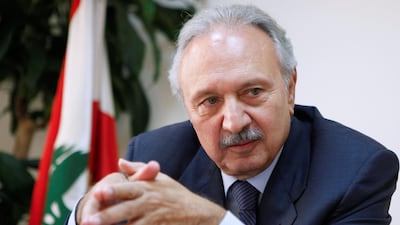Three of Lebanon's main political parties agreed on 75-year old former finance minister and billionaire businessman Mohammad Safadi on Thursday evening as their choice to become Lebanon’s new prime minister.
Caretaker Foreign Minister Gebran Bassil, head of the Free Patriotic Movement (FPM), confirmed on Friday that Mr Safadi would be nominated for the post when formal deliberations on forming the next government begin in parliament on Monday.
By picking a well-connected moderate Sunni Muslim such as Mr Safadi, Lebanese leaders might be seeking reassure the international community as the country lurches towards economic collapse.
But Mr Safadi, who amassed his fortune largely through real estate, is also a retired politician with a string of alleged corruption cases behind him, and protesters have clearly demanded a change from the Lebanon's current political elite, whom they consider to be old and corrupt.
“Mr Safadi is a personality who could build trust with the international community but I think his nomination will fail, especially with the young and the spirit of the revolution demanding radical change” said Sami Nader, director of the Levant Institute for Strategic Affairs in Lebanon.
"It's quite an audacious choice. They are not listening to what people want," Sami Atallah director of the Lebanese Centre for Policy Studies, told The National. "This could be a litmus test. If they have another candidate in mind that they really want, they could backtrack and introduce another name."
Mr Safadi made his fortune mainly in real estate dealings in Saudi Arabia and the UK, where he lived during Lebanon’s 1975-1990 civil war. He moved back to Lebanon in 1995 and entered politics a few years later when he was elected to parliament from his home town of Tripoli in 2000, a seat he held for nearly two decades.
During that time he served as minister of public works and transport, from 2005 to 2008, acting minister of water and energy (2007-2008), economy minister (2008-2011), and finance minister (2011-2014).
Mr Safadi is said to be close to caretaker Prime Minister Saad Hariri, who resigned on October 29, having withdrawn from the parliamentary election in Tripoli last year to support Mr Hariri’s Future Movement.
His wife Violette Safadi, 38, a former TV presenter and a public affairs consultant at the economy and finance ministries between 2010 and 2013, was appointed minister of state for economic empowerment of women and youth in the government Mr Hariri formed in January.
Both Mr Safadi and Mr Hariri are Sunni Muslims, a requirement to be prime minister in Lebanon, where leadership posts are divided among the country’s different religious groups.
Mr Safadi is considered to be a moderate politician despite accusations of having ties with Lebanon’s pro-Syrian political parties, represented by the three parties who nominated him on Thursday: the FPM, Hezbollah and its Shiite ally Amal.
"His keeps his affinities with pro-Syrian parties discreet. He does not flaunt them like some other Tripoli politicians," Ornella Antar, a freelance journalist from Tripoli, told The National.
As soon as Mr Safadi’s name was put forward on Thursday, Lebanese social media was inundated with videos highlighting his connection to high-profile corruption cases and flashy real estate projects.
The most high-profile corruption case Mr Safadi has alleged links to dates back to 2006, when his name came up in a UK investigation into a controversial arms deal between British arms company BAE and Saudi Arabia, according to British newspaper The Guardian.
In 2010, BAE agreed to pay nearly $450 million (Dh1.65bn) in penalties to end long-running investigations into questionable payments both in the UK and in the United States.
In Lebanon, Mr Safadi has invested in Zeitunah Bay, a luxury waterfront development in the capital that has become a symbol of the disparity between the country’s elite and the majority of Lebanese citizens who struggle to make ends meet.
Critics also highlighted on social media Mr Safadi's defence of Shadi Mawlawi, a Sunni Islamist active in Tripoli whose arrest by the General Security directorate in 2012, for links to an "armed terrorist organisation", triggered deadly sectarian clashes in the city.
“His support of Mawlawi at the time was well-received by the majority of Tripoli’s Sunni population,” said Ms Antar. “His links with Sunni terrorism might be exaggerated. But there have been rumours that he is corrupt, like many other Lebanese politicians.”

